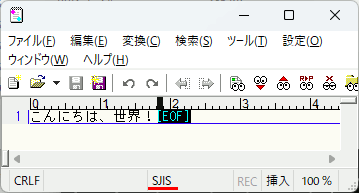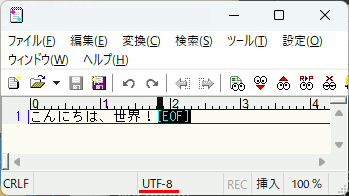スポンサーリンク
PythonからPybind11で作成したモジュールに文字列を渡すときの注意
Pythonの文字列はutf8で扱われているが、C++側はUnicodeに弱い。使用しているライブラリがマルチバイト(非utf8なstd::string)しか受け付けてないような場合はPython側でshift_jisに変換して渡してやると都合がいい。
#include <pybind11/pybind11.h> #include <cstdio> namespace py = pybind11; // 名前空間を指定 void func_setstring(std::string text) { FILE* fp = fopen("test.txt", "wb"); if (fp == NULL) { return; } fwrite(text.c_str(), sizeof(char), text.size(), fp); fclose(fp); } // PYBIND11_MODULE(モジュール名, モジュール変数名) // 生成物はmy_module_string.pydという名前にしなければならない PYBIND11_MODULE(my_module_string, m) { // 関数を定義 m.def("func_string", &func_setstring, "Write text to file", py::arg("text")); }
Shift-JISで渡す
import my_module_string text = "こんにちは、世界!" # テキストを書き込む my_module_string.func_string(text.encode("shift_jis"))

エディタで確認すると、SJISと判別されている。
UTF-8で渡す
そのまま渡すとutf-8で受け取る。C++はstd::stringでutf8を扱いたがるので紛らわしい。高度な文字列処理が必要ないならそのまま使用できる。ファイルに保存してやれば受け取った内容がutf-8であることをテキストエディタで確認できる。
import my_module_string text = "こんにちは、世界!" # テキストを書き込む my_module_string.func_string(text)

この記事のトラックバックURL: